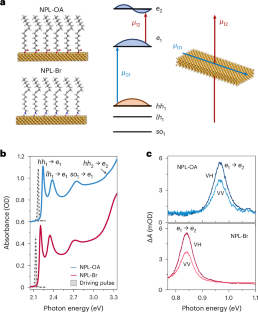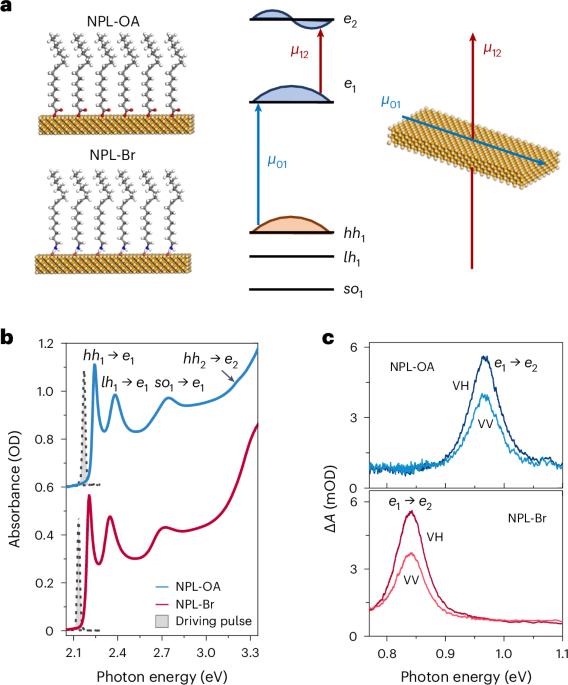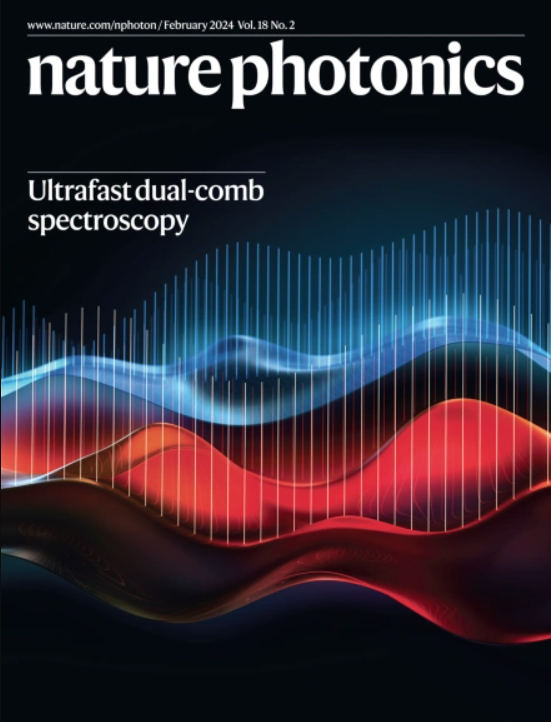观察可见光脉冲驱动的胶体纳米微粒中的 Floquet 状态及其相消现象
IF 32.3
1区 物理与天体物理
Q1 OPTICS
引用次数: 0
摘要
光与物质之间的相干相互作用会产生原始电子水平的光子压制复制品(即 Floquet 状态)。这就开辟了所谓的 Floquet 工程领域,即应用电磁场来创造固态材料的新非平衡相。直接观测这种 Floquet 状态通常需要低温、高真空环境下的被观测材料和低能红外光子或微波作为驱动力,这一直是个挑战。在此,我们报告了在环境条件下利用飞秒瞬态吸收观测碲镉硒纳米颗粒(量子阱的胶体类似物)中的浮凸态。亚带隙可见光光子可将重空穴态(|hh1〉)转变为弗洛克特态(|hh1 + ℏωL〉),该态可与第一量子化电子态(|e1〉)杂交。这样,我们就能利用近红外线光子,通过其向第二量子化电子态(|e2〉)的转变来探测弗洛克特态。在几百飞秒的退相时间内,我们也直接观测到了弗洛克特态向|e1〉真实种群的退相,我们的密度矩阵模拟也很好地再现了这一过程。本文章由计算机程序翻译,如有差异,请以英文原文为准。


Observation of Floquet states and their dephasing in colloidal nanoplatelets driven by visible pulses
Coherent interaction between light and matter generates photon-dressed replicas of the original electronic levels (that is, Floquet states). This opens up a so-called field of Floquet engineering that applies electromagnetic fields to create new non-equilibrium phases of solid-state materials. The direct observation of such Floquet states, which often requires low-temperature, high-vacuum housing of the interrogated materials and low-energy infrared photons or microwaves as the driver, has been challenging. Here we report the observation of Floquet states in CdSe nanoplatelets, which are the colloidal analogue of quantum wells, under ambient conditions using femtosecond transient absorption. A sub-bandgap visible photon dresses a heavy-hole state (|hh1〉) to a Floquet state (|hh1 + ℏωL〉) that can hybridize with the first quantized electron state (|e1〉). This enables us to probe the Floquet state using a near-infrared photon through its transition to the second quantized electron state (|e2〉). Dephasing of the Floquet state into the real population of |e1〉 is also directly observed with a dephasing time of a few hundred femtoseconds, which is well reproduced by our density matrix simulations. Researchers demonstrate the ambient-condition observation of Floquet states in CdSe nanoplatelets, a colloidal analogue of quantum wells.
求助全文
通过发布文献求助,成功后即可免费获取论文全文。
去求助
来源期刊

Nature Photonics
物理-光学
CiteScore
54.20
自引率
1.70%
发文量
158
审稿时长
12 months
期刊介绍:
Nature Photonics is a monthly journal dedicated to the scientific study and application of light, known as Photonics. It publishes top-quality, peer-reviewed research across all areas of light generation, manipulation, and detection.
The journal encompasses research into the fundamental properties of light and its interactions with matter, as well as the latest developments in optoelectronic devices and emerging photonics applications. Topics covered include lasers, LEDs, imaging, detectors, optoelectronic devices, quantum optics, biophotonics, optical data storage, spectroscopy, fiber optics, solar energy, displays, terahertz technology, nonlinear optics, plasmonics, nanophotonics, and X-rays.
In addition to research papers and review articles summarizing scientific findings in optoelectronics, Nature Photonics also features News and Views pieces and research highlights. It uniquely includes articles on the business aspects of the industry, such as technology commercialization and market analysis, offering a comprehensive perspective on the field.
 求助内容:
求助内容: 应助结果提醒方式:
应助结果提醒方式:


